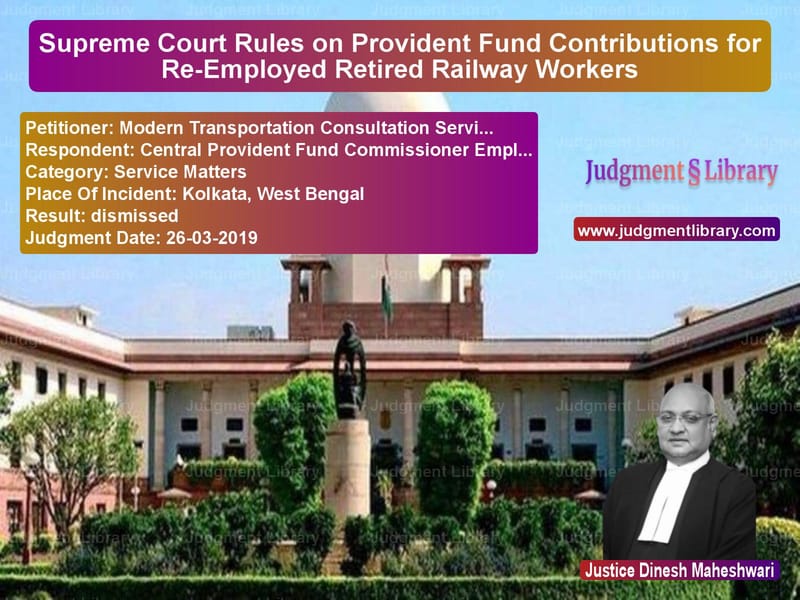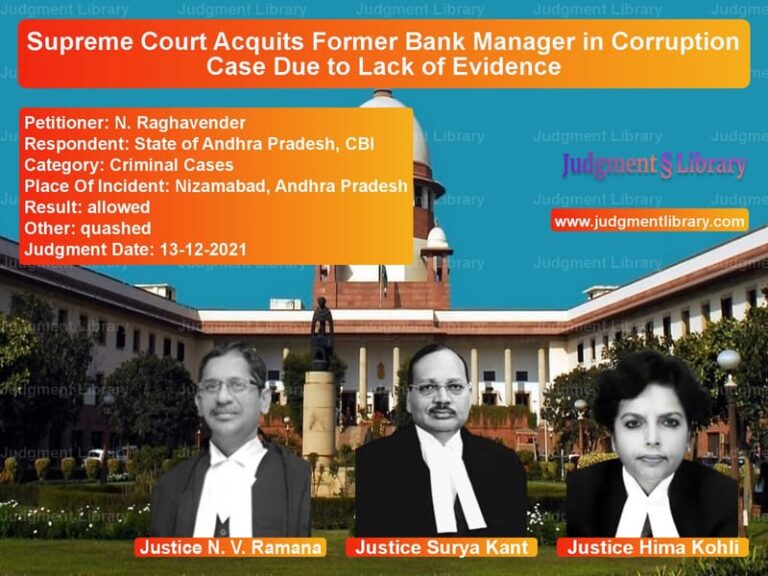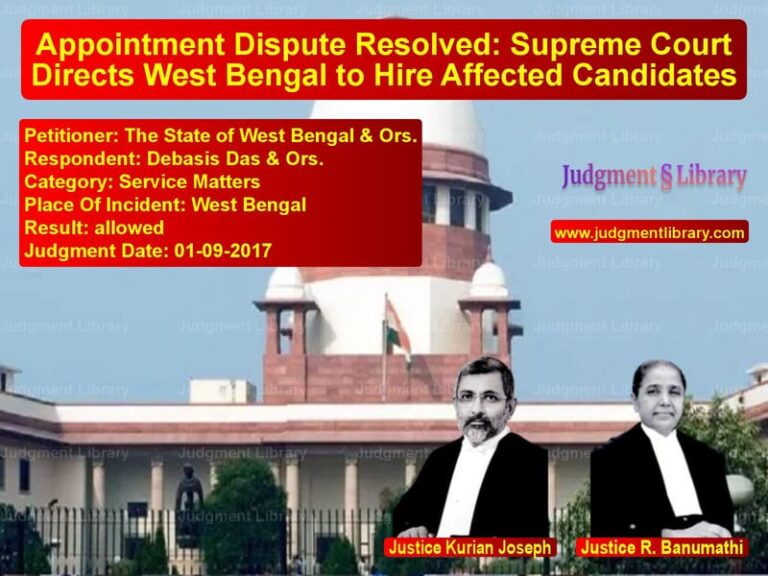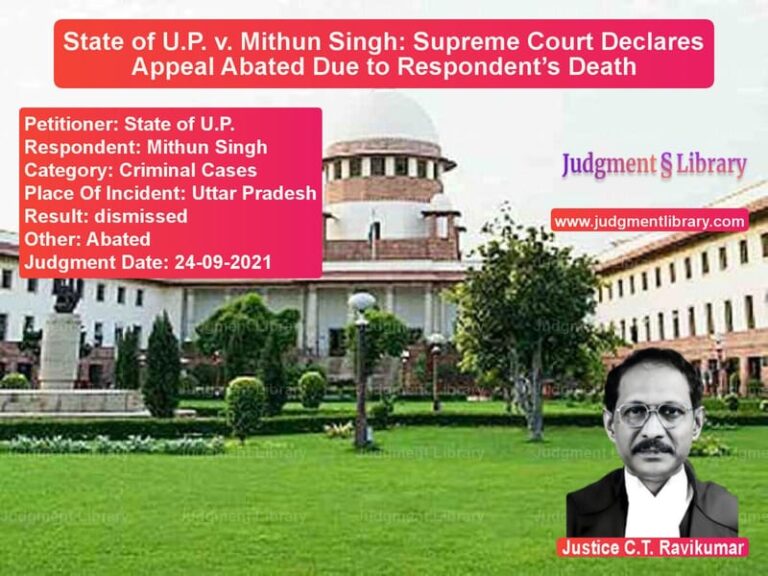Supreme Court Rules on Provident Fund Contributions for Re-Employed Retired Railway Workers
The case of Modern Transportation Consultation Services Pvt. Ltd. & Anr. vs. Central Provident Fund Commissioner Employees Provident Fund Organisation & Ors. revolved around whether retired Railway employees re-employed by a private company should be considered “excluded employees” under the Employees’ Provident Funds and Miscellaneous Provisions Act, 1952. The Supreme Court ruled that such employees were not exempt and must be covered under the Act.
Background of the Case
The appellants, Modern Transportation Consultation Services Pvt. Ltd., engaged retired employees of the Indian Railways for manning railway systems under a contract with Damodar Valley Corporation (DVC). The company contended that these workers had already withdrawn their full provident fund (PF) accumulations under the General Provident Fund (GPF) scheme at the time of their retirement and should therefore be considered “excluded employees” under the Employees’ Provident Fund Scheme, 1952. This would exempt the employer from making further provident fund contributions on their behalf.
The Central Provident Fund Commissioner and the Regional Provident Fund Commissioner rejected this argument, asserting that once these employees joined a new establishment covered under the Act, they were required to be part of the PF scheme again.
Legal Issues Before the Supreme Court
The key question before the Court was:
- Whether retired Railway employees, who had withdrawn their PF accumulations from the GPF, should be considered “excluded employees” under the Employees’ Provident Fund Scheme, 1952 when re-employed by a private company.
Arguments by the Petitioner (Modern Transportation Consultation Services Pvt. Ltd.)
- The retired Railway employees had already availed all their superannuation benefits, including provident fund withdrawals and pensions under the GPF scheme.
- Since these employees were not covered under the Employees’ Provident Fund (EPF) scheme while working for the Railways, they should not be subject to it after retirement.
- The Act aims to provide social security, but forcing PF contributions for employees who have already withdrawn their funds amounts to “unjust enrichment.”
- The High Court’s judgment misinterpreted “excluded employees” under Paragraph 2(f) of the EPF Scheme, 1952.
Arguments by the Respondents (Central Provident Fund Commissioner & EPFO)
- The term “excluded employee” applies only to those who have withdrawn their accumulations from the EPF scheme, not from any other fund such as the GPF scheme of the Railways.
- Once these individuals join a new establishment covered under the EPF Act, they must become PF members.
- The Act applies to establishments, not individual employees, meaning that all employees working in a covered establishment must be part of the scheme.
- Allowing re-employed Railway retirees to be “excluded employees” would create an arbitrary distinction between workers and defeat the purpose of social security laws.
Supreme Court’s Analysis and Judgment
The Supreme Court reviewed the Act and the Scheme, particularly the definition of “excluded employees” in Paragraph 2(f) of the EPF Scheme, 1952. The Court observed:
- “The definition of ‘excluded employees’ in Paragraph 2(f) as also the stipulation in Paragraphs 26 and 69 of the Scheme of 1952 refer only to the Fund under the EPF Scheme and not to any other fund such as the GPF.”
- “The provisions of the Act do not impose any age limit for membership. Hence, the argument that the employees were over 58 years old is irrelevant.”
- “The Scheme aims to ensure continued financial security for workers. Allowing exemptions for re-employed retirees would defeat the purpose of social welfare legislation.”
Final Judgment
The Supreme Court ruled that:
- Retired Railway employees who were re-employed by the appellant were not excluded employees under the EPF scheme.
- The company was obligated to make provident fund contributions for them.
- There was no exemption from PF contributions simply because the employees had previously withdrawn their GPF accumulations.
- The appeal was dismissed, upholding the liability of the company to comply with EPF regulations.
Significance of the Judgment
This ruling reinforces that:
- Social security laws are applicable to all employees working in covered establishments, irrespective of their past employment history.
- Retirement and withdrawal of GPF benefits do not exempt an employee from EPF contributions upon re-employment.
- The concept of “excluded employees” applies only within the EPF framework and does not extend to those who were previously covered under other pension schemes.
Conclusion
The Supreme Court’s decision in Modern Transportation Consultation Services Pvt. Ltd. vs. Central Provident Fund Commissioner is a significant ruling clarifying the applicability of provident fund laws to re-employed retired government employees. The judgment ensures that employers do not evade PF contributions by exploiting legal loopholes and upholds the principles of financial security for employees under the EPF Act.
Petitioner Name: Modern Transportation Consultation Services Pvt. Ltd. & Anr..Respondent Name: Central Provident Fund Commissioner Employees Provident Fund Organisation & Ors..Judgment By: Justice Dinesh Maheshwari.Place Of Incident: Kolkata, West Bengal.Judgment Date: 26-03-2019.
Don’t miss out on the full details! Download the complete judgment in PDF format below and gain valuable insights instantly!
Download Judgment: Modern Transportatio vs Central Provident Fu Supreme Court of India Judgment Dated 26-03-2019.pdf
Direct Downlaod Judgment: Direct downlaod this Judgment
See all petitions in Pension and Gratuity
See all petitions in Public Sector Employees
See all petitions in Employment Disputes
See all petitions in Judgment by Dinesh Maheshwari
See all petitions in dismissed
See all petitions in supreme court of India judgments March 2019
See all petitions in 2019 judgments
See all posts in Service Matters Category
See all allowed petitions in Service Matters Category
See all Dismissed petitions in Service Matters Category
See all partially allowed petitions in Service Matters Category







